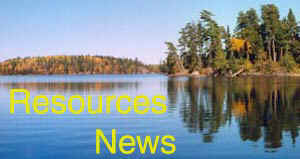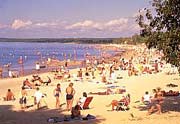
Information About Natural Resources and Outdoor Activities Across Canada and Around the World

Home Page
including index of current stories Older stories on Resources News
Links to general resource, environmental sites
Links to non-profit environmental/resource groups
Links to environmental/resource news sources
E-mail Resources News
Big Lake - Big Problems
Lake Winnipeg is one of the biggest lakes, after the Great Lakes, in North America. It also has big environmental problems. Among those problems - E.coli bacteria and blue green algae.
In mid-July, record-high bacterial contamination was discovered at two of the lake's most popular beaches, West Grand Beach and Gimli Beach. At Gimli, the count soared to an alarming 1,364 E. coli bacteria per 100 millilitres of water. The allowable limit under national water recreation guidelines for safe swimming is 200. At West Grand Beach, readings hit 1,387.
This is the second year in a row that swimmers at the lake have been warned about high E. coli contamination levels. It's been suggested that birds, particularly gulls, may be major contributors to the high counts - although water flows into the lake from across a large area of Western Canada and the north central U.S. All those areas are of course primarily agricultural - complete with runoff from hog and cattle producing areas.
In regards to excessive levels of algae, the lake seems to be doing better than last year. Scientists have found little evidence this year of the thick, green slime that covered much of the lake last year. Cool weather in the early summer and high water levels are thought to be responsible for the improvement.
But the problem may still get worse this year. Algae blooms are still possible in September if the weather remains warm. And heavy rainfall in the early part of the summer likely washed more phosphorus into the lake. That's the nutrient in fertilizer, manure, sewage and industrial waste that contributes to massive algae blooms. It could mean that there'll be big problems with algae next summer.